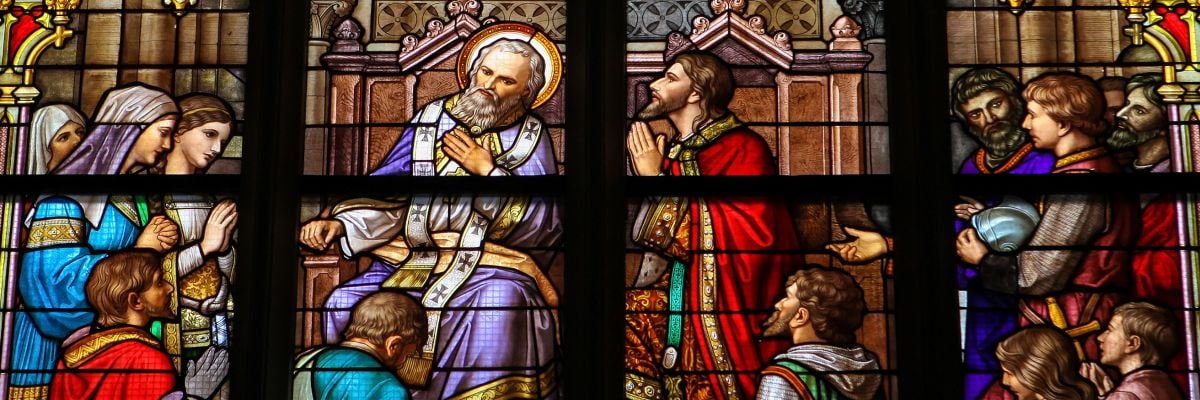
1. Why do I have to go to a priest for confession instead of going straight to God? After all, the Bible says that “there is one God, and there is one mediator between God and men, the man Christ Jesus” (1 Tim. 2:5).
The Lord does want us to come to him when we fall into sin. He wants to bring us forgiveness so much that he gave the apostles the power to forgive sins. This power given to the apostles and their successors does not come from within them but from God. Throughout the New Testament, Jesus gave the apostles authority over unclean spirits, the authority to heal, the authority to raise people from the dead, et cetera. No Christian assumes that these powers came from the men themselves, since God is the one that has chosen to use them to manifest his power and mercy.
In the words of Paul, “All this is from God, who through Christ reconciled us to himself and gave us the ministry of reconciliation” (2 Cor. 5:18). The apostles and their successors are merely ambassadors for Christ (2 Cor. 5:20), bringing his forgiveness to the world through the sacraments and the message of the gospel. If God has chosen to bring his message of forgiveness to the world by means of sinful, human ambassadors, why would he not be able to give these messengers the power to forgive and retain sins? And why would this not be a natural way for Jesus to extent his merciful presence on earth for all generations?
If Jesus has set up a way for us to draw near to him and receive his grace, why should we prefer another route? We would be like the three-year-old with his father who, in a rush to get home from the store, begins to run. “Let me pick you up,” the father offers. The child says, “No, Dad. I’m fast. Just watch me.” It takes them much longer to get home because the child’s pride prevents him from accepting his father’s help. Likewise, God does hear us when we ask for forgiveness, but it is dangerous and often prideful to stay away from what the saints call the “medicine box”—the confessional. Why would a person wish to overcome their sins alone when they have the God-given power of the apostles’ successors at their disposal?
2. Where is the sacrament of confession in the Bible?
As soon as Jesus rose from the dead and earned salvation for us, he brought his apostles a new gift. After speaking peace to them, he said, “As the Father has sent me, even so I send you” (John 20:21). Just as Jesus was sent by the Father to reconcile the world to God, Jesus sent the apostles to continue his mission.
Jesus then breathed on the apostles. This is a verse that is often passed over, but it has extraordinary significance because it is only the second time in all of Scripture where God breathes on anyone. The other instance was at the moment of creation, when God breathed his own life into the nostrils of Adam. This should tell us that something of great importance is taking place. Upon doing this, Jesus said, “Receive the Holy Spirit. If you forgive the sins of any, they are forgiven; if you retain the sins of any, they are retained” (John 20:22–23).
Notice that Jesus is not simply commissioning the apostles to preach about God’s forgiveness. He is not saying, “Go tell everyone that when God forgives men’s sins, they’re forgiven.” In using the second person plural you, Jesus is telling his apostles that by the power of the Holy Spirit he has given them the power to forgive and retain the sins of men. Having the power to forgive and to retain sins implies that the apostle knows what a person’s sins are, which in turn implies oral confession. Otherwise, how is the apostle to know what to retain or forgive?
In the same way that Jesus gave his apostles other supernatural powers (such as raising men from the dead), he gave them power to absolve sins (raising them from spiritual death). In Matthew 9, we read that Jesus forgave a paralytic and then healed him so “that you may know that the Son of man has authority on earth to forgive sins” (Matt. 9:6)
After he exercised this power as a man, the crowds glorified God for having given “such authority to men” (Matt. 9:8, emphasis added). Notice that Matthew indicates this power to forgive sins had been given to men, and not simply to a man.
3. Doesn’t confession of one’s sins imply that Christ’s work was insufficient? The Bible says that if I believe that Jesus is Lord, I’ll be saved.
The passage you referred to is Acts 16:31, which reads, “Believe in the Lord Jesus, and you will be saved.” Sounds pretty simple. However, the Bible says much more about salvation and forgiveness. Jesus repeatedly affirmed that if we do not forgive others, we will not be forgiven (Matt. 6:15). When Jesus breathed on the apostles in John 20, he gave them the power to retain sins. But if one’s salvation is contingent upon nothing other than a verbal profession of faith, then there is no reason why Jesus would given any man the power to retain sins. In the midst of all of these passages what we need to be careful of is that we do not camp out on one particular Bible passage without consulting the rest of Scripture.
It is because of the work of Christ that we obtain forgiveness. All Christians can agree on that. What needs to be discussed is how that forgiveness comes to mankind. When Ananias spoke to Paul in Acts 22:16, he said, “And now why do you wait? Rise and be baptized, and wash away your sins” (Acts 22:16). Later in the New Testament, the forgiveness of sins is tied to the sacrament of the anointing of the sick (James 5:13–15). Just as these Biblical practices are channels of God’s forgiving grace, the sacrament of confession does not add to or take away from the finished work of Christ. It is evidence of the finished work of Christ in our midst.
4. How can Catholics claim confession to a priest is an apostolic tradition? I heard it was invented in 1215 at the Fourth Lateran Council.
What you heard probably came from the anti-Catholic book Roman Catholicism by Loraine Boettner. This book is well known for its inaccurate history, and the reference you gave is a primary example. During the Fourth Lateran Council, the Church reminded the faithful in an official way what had already been the ancient practice of the Church—to confess mortal sins at least once a year. In no way was this the initiation of a new sacrament or even a new way to celebrate an old sacrament. If the Church did initiate the sacrament of reconciliation in 1215, why were there no cries at the time of invention? The obvious answer is no one objected because they were aware that the sacrament was over a millennium old at the time of the Council.
Consider the following early Christian writings from the first five centuries:
“Confess your sins in church, and do not go up to your prayer with an evil conscience. This is the way of life. . . . On the Lord’s Day gather together, break bread, and give thanks, after confessing your transgressions so that your sacrifice may be pure” (Didache 4:14, 14:1 [A.D. 70]).
“[Regarding confession, some] flee from this work as being an exposure of themselves, or they put it off from day to day. I presume they are more mindful of modesty than of salvation, like those who contract a disease in the more shameful parts of the body and shun making themselves known to the physicians; and thus they perish along with their own bashfulness”(Tertullian, Repentance 10:1 [A.D. 203]).
“[The bishop conducting the ordination of the new bishop shall pray:] God and Father of our Lord Jesus Christ . . . pour forth now that power which comes from you, from your royal spirit, which you gave to your beloved Son, Jesus Christ, and which he bestowed upon his holy apostles . . . and grant this your servant, whom you have chosen for the episcopate, [the power] to feed your holy flock and to serve without blame as your high priest . . . and by the Spirit of the high-priesthood to have the authority to forgive sins, in accord with your command” (Hippolytus, Apostolic Tradition 3 [A.D. 215]).
“Priests have received a power which God has given neither to angels nor to archangels. It was said to them: ‘Whatsoever you shall bind on earth shall be bound in heaven; and whatsoever you shall loose, shall be loosed.’ Temporal rulers have indeed the power of binding; but they can only bind the body. Priests, in contrast, can bind with a bond which pertains to the soul itself and transcends the very heavens. Did [God] not give them all the powers of heaven? ‘Whose sins you shall forgive,’ he says, ‘they are forgiven them; whose sins you shall retain, they are retained.’ What greater power is there than this? The Father has given all judgment to the Son. And now I see the Son placing all this power in the hands of men” (John Chrysostom, The Priesthood 3:5 [A.D. 387]).



